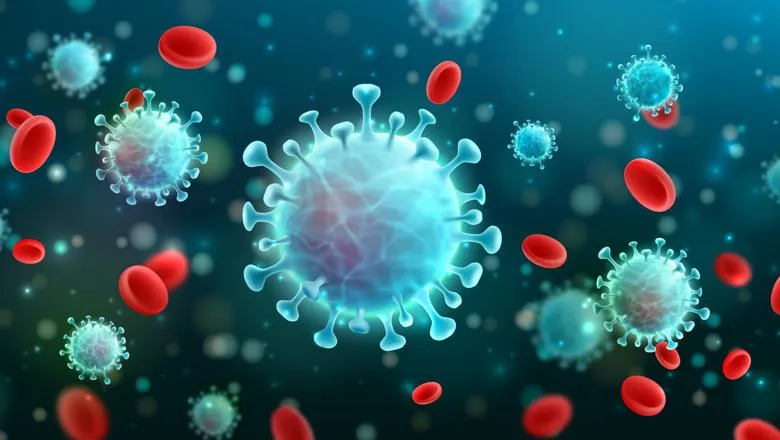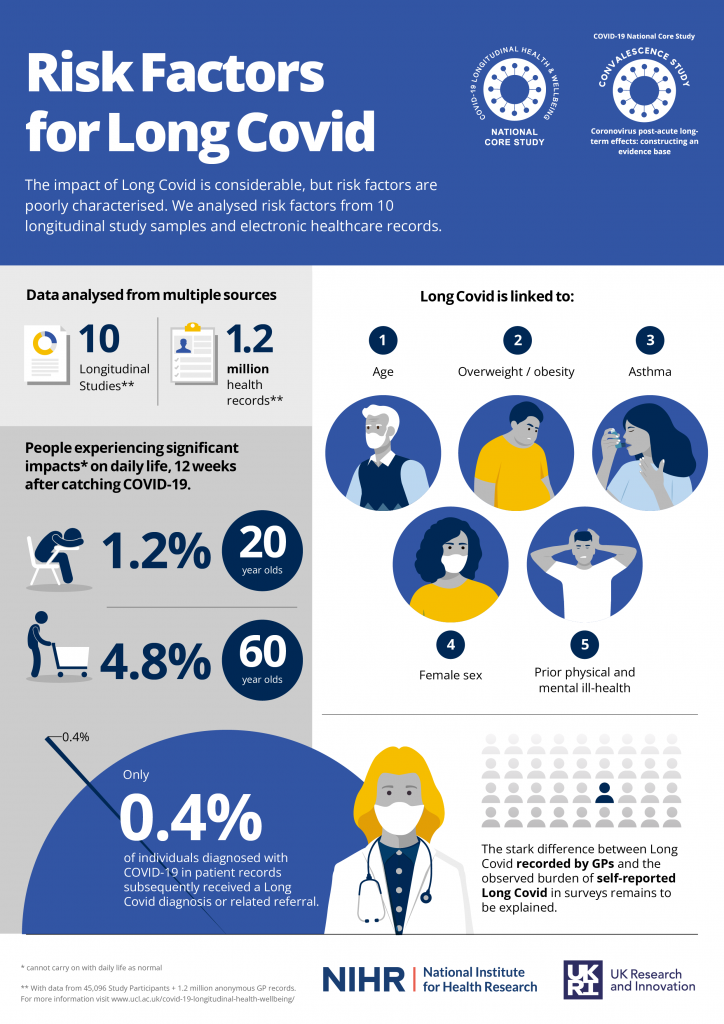29th June 2022 – King’s College London
One in six (17%) middle-aged people who report being infected by SARS-CoV-2 also report long COVID symptoms, while this falls to one in 13 (7.8%) among younger adults who reported having Covid-19, according to a new study led by King’s and UCL which is now published in Nature.

The preliminary findings, part of the UKRI-NIHR funded multi-institution CONVALESCENCE study and submitted to the preprint server medRxiv, also found that women were 50% more likely to report long COVID than men, and that the risk for long COVID symptoms increases with age, is linked to poorer pre-pandemic mental and physical health and is associated with a previous diagnosis of asthma. Non-white ethnic minority groups had lower odds of reporting long COVID (about 70% less likely).
Using a stricter definition of long COVID as impacting routine daily activities, the researchers found that it affected 1.2% of 20-year-olds who had Covid-19, but 4.8% of people in middle age.
The researchers analysed anonymised data from 1.2 million primary health records across the UK together with 10 population-based cohort studies with 45,096 participants. Using existing cohort studies, whose participants are surveyed regularly, allowed the research team to include cases not reported to the GP and to look at people’s health before the pandemic.
Knowing which factors increase the risk of long COVID is an important first step in understanding how best to prevent and treat this condition.
Professor Nishi Chaturvedi (MRC Unit for Lifelong Health and Ageing at UCL), who leads the ongoing CONVALESCENCE study, said: “Getting consistent findings from this combination of many different studies gives us greater confidence that our findings are robust, which is critical given that we know so little about long COVID.”
First author Dr Ellen Thompson, of King’s College London, said:
“It’s really important to identify risk factors in the population so we can prepare and devise prevention strategies, protecting people at increased risk of poor outcomes from COVID-19.”
First author Dr Dylan Williams (MRC Unit for Lifelong Health & Ageing at UCL) said:
“Amassing this body of evidence would usually take many months or years to assemble but we achieved this more quickly through massive, constant collaboration by researchers at many different institutions.
Dr Claire Steves from the School of Life Course Sciences said:
“Our findings hint at the mechanisms behind long COVID. Next, we need to identify the predispositions that might explain, for example, why women or individuals with asthma appear to be at higher risk. Could a liability to suffer from autoimmunity or allergies play a role? Establishing concrete research avenues to go down will eventually lead to benefits for people with long COVID.”
The study forms part of the larger COVID-19 Longitudinal Health and Wellbeing National Core Study, which is investigating the health, social and economic impacts of the COVID-19 pandemic by combining rich pre-COVID data collected from participants of numerous national research studies with national anonymised electronic health records.
The researchers investigated if the risks of developing long-term Covid symptoms differed by several pre-pandemic socioeconomic and health characteristics. Coordinated analyses of the longitudinal studies and health records data showed consistently that female sex and increasing age (up to 70 years) were associated with increased odds of long COVID.
Pre-existing adverse mental health was associated with a 50% increase in the odds of reporting long COVID, while asthma was the only specific prior medical condition consistently associated with greater risk of developing lasting Covid-19 symptoms (a 32% increase). Participants were identified as having pre-existing adverse mental health if they had been diagnosed with one of a number of conditions such as depression and bipolar disorder, or their responses to questionnaires indicated they had a mental health condition before the pandemic.
Analysis was conducted on 6,899 individuals self-reporting COVID-19 from 45,096 surveyed adult participants of ongoing longitudinal studies in the UK, and on 3,327 cases assigned a long COVID code in primary care electronic health records out of 1,199,812 adults diagnosed with acute COVID-19. Long COVID, identified as Post-COVID-19 syndrome in the study, is defined as symptoms persisting for longer than 12 weeks after the initial infection.
The research team included researchers at the Universities of Bristol, Edinburgh, Glasgow, and Oxford, as well as the London School of Hygiene & Tropical Medicine, and the Bradford Royal Infirmary.
Dr Fiona Glen, programme director for the NICE Centre for Guidelines, said:
“There is still much we do not know about the long-term effects of COVID-19. We continue to monitor and assess the latest evidence on the long-term effects allowing us to continuously update our guideline recommendations. We welcome this new research which will ensure we have a better understanding of how to manage the care and treatment of patients with prolonged symptoms of COVID-19.”










